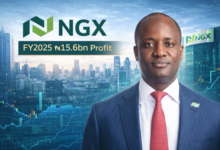SEC takes campaign against Ponzi Schemes to markets, churches, mosques

In a move aimed at protecting millions of Nigerians from financial fraud, the Securities and Exchange Commission (SEC) has commenced a nationwide grassroots campaign to educate citizens on the dangers of investing in Ponzi schemes.
The initiative, flagged off Friday at the bustling Wuse Market in Abuja, underscores the SEC’s growing concern over the persistence and evolution of fraudulent investment schemes that continue to prey on unsuspecting Nigerians, especially amid current economic hardships.

Dr. Emomotimi Agama, the recently appointed Director-General of the SEC, personally led the outreach, emphasizing that the Commission would no longer rely solely on traditional media or its website to disseminate critical investor information.
“It is difficult for many people, especially in informal markets, to access the right information,” Agama said. “Sitting in our offices expecting them to visit our website is no longer enough. We are now taking the message directly to them — physically — in their places of work and worship.”
The move comes at a critical time. Nigeria’s economic challenges — rising inflation, high unemployment, and depreciating purchasing power — have made citizens more susceptible to schemes that promise unusually high returns in very short periods.
According to Agama, the campaign against Ponzi SAccording to Agama, the campaign against Ponzi Schemes will extend to markets, churches, mosques, hospitals, and military barracks nationwide, ensuring that no demographic is left vulnerable to fraudulent investment schemes. He described Ponzi schemes as a “global menace” but stressed that SEC Nigeria is determined to tackle the issue head-on with proactive, on-the-ground engagement — a significant departure from the regulatory agency’s traditional reactive posture.
According to Agama, the campaign against Ponzi Schemes will extend to markets, churches, mosques, hospitals, and military barracks nationwide, ensuring that no demographic is left vulnerable to fraudulent investment schemes. He described Ponzi schemes as a “global menace” but stressed that SEC Nigeria is determined to tackle the issue head-on with proactive, on-the-ground engagement — a significant departure from the regulatory agency’s traditional reactive posture.
According to Agama, the campaign against Ponzi Schemes will extend to markets, churches, mosques, hospitals, and military barracks nationwide, ensuring that no demographic is left vulnerable to fraudulent investment schemes. He described Ponzi schemes as a “global menace” but stressed that SEC Nigeria is determined to tackle the issue head-on with proactive, on-the-ground engagement — a significant departure from the regulatory agency’s traditional reactive posture.
According to Agama, the campaign against Ponzi Schemes will extend to markets, churches, mosques, hospitals, and military barracks nationwide, ensuring that no demographic is left vulnerable to fraudulent investment schemes. He described Ponzi schemes as a “global menace” but stressed that SEC Nigeria is determined to tackle the issue head-on with proactive, on-the-ground engagement — a significant departure from the regulatory agency’s traditional reactive posture.
will extend to markets, churches, mosques, hospitals, and military barracks nationwide, ensuring that no demographic is left vulnerable to fraudulent investment schemes. He described Ponzi schemes as a “global menace” but stressed that SEC Nigeria is determined to tackle the issue head-on with proactive, on-the-ground engagement — a significant departure from the regulatory agency’s traditional reactive posture.
During the Wuse Market engagement, traders openly shared painful testimonies of how they had been lured into Ponzi operations. One trader, Mr. Abraham Onoja, recounted how he lost N7 million after initially seeing “proof” of profits.
“I first invested N2 million and received N2.45 million a week later,” Onoja said. “That success story encouraged me to invest N7 million more, but the operators vanished overnight.”
Similarly, Mr. Chijioke Nnodim, another trader, urged fellow citizens to thoroughly verify the legitimacy of any investment opportunity before parting with their funds.
Financial analysts note that Ponzi schemes tend to flourish in low-trust environments where access to verified financial education is limited, and formal investment channels are perceived as either inaccessible or untrustworthy.
Agama appealed to the media to amplify the campaign and support efforts to enlighten Nigerians across all regions and sectors.
Why This Matters for Nigeria’s Business and Investment Climate
The SEC’s proactive drive comes at a time when rebuilding public trust in Nigeria’s capital markets is essential. The financial sector — critical to economic diversification and the realization of government initiatives like the Presidential Enabling Business Environment Council (PEBEC) and Nigeria’s National Development Plan (NDP) — cannot thrive where fraudulent schemes undermine confidence.
The aviation industry, for instance, a major driver of business travel and trade facilitation (and recently boosted by Air Peace’s expansion of regional and international routes), also depends heavily on investor confidence for the capital-intensive demands of fleet expansion, infrastructure development, and service delivery.
A more vigilant, informed investing public helps stabilize not just personal finances but broader sectors reliant on credible financial intermediation.
By intensifying its investor education efforts, SEC hopes to create a healthier, more resilient investment ecosystem — one capable of attracting both domestic and foreign capital for the next phase of Nigeria’s economic transformation.












